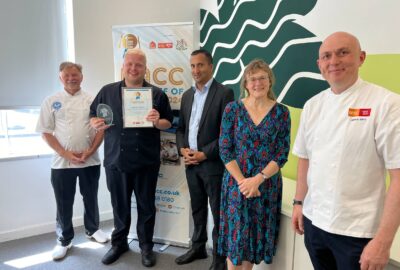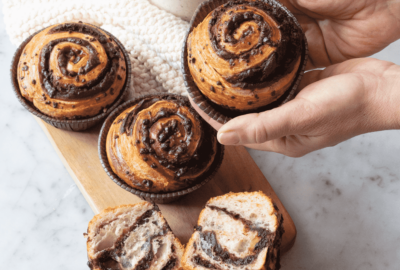Our love of freshly brewed tea or a carefully crafted cup of coffee accompanied by a slice of cake has not diminished since lockdown, in fact, the ritual tea break has become a fundamental part of daily life. Whether it is a regular “cup of joe” to get going in the morning, or the meditative process of making tea to provide normality and comfort in an otherwise chaotic world, many of us indulge in a hot beverage at least once a day. The everyday escapism provided by cafes to meet friends or to find a corner for contemplation has been missed by the public, with 42.6%[1] citing it as the social outing they craved the most during lockdown.
Since lockdown eased, operators have eagerly been reopening across the country, with many entrepreneurs making swift changes to their menus to capture new audiences and meet the changing needs of millions of consumers. As 2021 comes to a close, we take a closer look at how hot beverages and teatime treats are set to evolve over the next few months and the key areas of focus for operators in this sector.
Good Mood Food
Over the years we have witnessed an increasing focus on health and wellbeing across the hospitality sector. As this trend gains pace, micro segments have been created, generating numerous opportunities for the hot beverage and teatime treat market. When we consider health and wellbeing today, it is no longer a case of providing fresh fruit and low fat foods. While there is still a strong market for energy balls, sugar free drinks and decaf coffee or tea, the market is becoming more sophisticated, customers are seeking food and drink that will improve their gut health or provide additional vitamins for a boost to their immune system, enhance energy levels or improve the quality of their skin.
The health and wellbeing market is exploding with innovative new products attracting a progressively more adventurous consumer group. This is giving rise to the introduction of new healthy coffee additives including turmeric, collagen creamer and mushroom coffee as well as new hot beverages such as golden milk lattes and brewed cacao. In the tea sector, one in five consumers bought green, herbal or fruit tea on their last visit[2] to a cafe and the once exotic flavour of Japan’s matcha tea is now so commonplace, it is widely used in cakes, bakes and ice cream. “As consumers continue to explore and trial new hot beverage blends out of home, they want operators to provide them with a selection to test new flavours,” Comments Michelle Jee, Tetley Senior Brand Manager.
A Touch of Luxe
Whether adding syrups to hot beverages, roasting your own coffee beans or adding a pupaccino to the menu, most operators are adept at maximising profit margin opportunities in the hot beverage sector and there is even greater scope yet to come in 2022. Multiple lockdowns and restrictions may have caused most of us to tighten our purse strings, however our desire to indulge a little is going to positively impact the hot beverage and teatime treat market over the coming months. “As they feel the pinch and cut back on big blowouts, consumers look for little ways to upgrade everyday rituals for example; plain black coffee gets upgraded to iced coffee with salted caramel foam, toast swaps out for bake-from-frozen chocolate croissants” Food trend – the food people: Mini Splurge for 2021-2022.
Premiumisation of hot beverages and teatime treats is not only for the coffee shop sector with their highly trained coffee afficionados at hand and homemade bakes. Hotels, education and the care sector can elevate their offering by introducing a few simple changes. Jacobs Douwe Egberts have launched a new range of instant speciality coffee while Taylors of Harrogate offer fresh coffee bags and a premium blend of Yorkshire Tea. “Hoteliers looking to offer their guests the most premium of experiences should consider offering guests our finest blend, Yorkshire Gold,” says Greg Harvey, OOH Sales Controller at Taylors of Harrogate. “We choose teas from our three favourite origins – Assam, Kenya and Rwanda – and buy them from the top ten tea gardens in the world.”
Menu Must Haves
As plant-based alternatives continue to rise in popularity, one of the stand-out menu must haves are milk alternatives. Mintel recently reported that almost a quarter (23%)[3] of British people used plant-based milk alternatives in the three months to February 2019.
While oat, almond and coconut milk are core dairy substitutes that operators should consider stocking, we are also seeing new, unusual flavours launching such as potato milk. When determining which dairy substitute to buy, operators should pay close attention to the quality of the ingredients used – for example, does your oat milk contain more emulsifiers for bulking than oats and can it froth for cappuccinos and lattes?
Spare a Thought for Sustainability
There is still much to be done to change the course of our behaviour towards a more sustainable lifestyle, however the nation is gradually warming up to it, with 67% of coffee drinkers agreeing that its worth paying more for coffee that supports fair pay for coffee farmers and over 50% of consumers recently surveyed agreeing that coffee shops should charge a fee for using disposable cups.
While the experience of independent chain Boston Tea Party indicates that consumers may not be ready for a complete ban on single-use coffee cups just yet, there are plenty of ways to improve your eco-friendly credentials. Food and beverage brands are becoming more conscientious about their packaging, acknowledging their role in the food chain. “The revived Tetley envelope range includes a variety of fruity and green infusions, consumers can be reassured knowing that the new range now features fully biodegradable tea bags, which remain completely plastic free and presented in 100% recyclable packaging.” Says Michelle Jee, Senior Brand Manager, Tetley.
The market for eco-friendly products continues to mature and there should be nothing preventing an operator from selecting compostable alternatives to plastic food packaging, rewarding consumers who bring their own takeaway cups, actively promoting in store recycling bins and reducing food waste as standard activities to positively affect their environmental impact.
[1] Allegra Strategies (May 2020). Covid-19 Impact on the UK Population Survey Results
[2] Allegra project Tea UK 2019
[3] Mintel 2019, Milking the Vegan Trend


